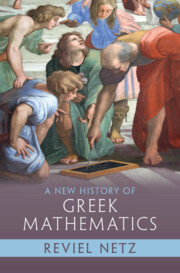Book contents
- A New History of Greek Mathematics
- A New History of Greek Mathematics
- Copyright page
- Dedication
- Contents
- Plates
- Preface
- Acknowledgments
- Chapter 1 To the Threshold of Greek Mathematics
- Chapter 2 The Generation of Archytas
- Chapter 3 The Generation of Archimedes
- Chapter 4 Mathematics in the World
- Chapter 5 Mathematics of the Stars
- Chapter 6 The Canonization of Greek Mathematics
- Chapter 7 Into Modern Science: The Legacy of Greek Mathematics
- Epilogue: Bringing to the Boil
- Index
Chapter 7 - Into Modern Science: The Legacy of Greek Mathematics
Published online by Cambridge University Press: 01 September 2022
- A New History of Greek Mathematics
- A New History of Greek Mathematics
- Copyright page
- Dedication
- Contents
- Plates
- Preface
- Acknowledgments
- Chapter 1 To the Threshold of Greek Mathematics
- Chapter 2 The Generation of Archytas
- Chapter 3 The Generation of Archimedes
- Chapter 4 Mathematics in the World
- Chapter 5 Mathematics of the Stars
- Chapter 6 The Canonization of Greek Mathematics
- Chapter 7 Into Modern Science: The Legacy of Greek Mathematics
- Epilogue: Bringing to the Boil
- Index
Summary
This chapter moves into a much faster clip. We still look at individual authors, but we take each briefly and consider the authors as tokens for entire civilizations (I also reduce, even further, my use of endnotes: other than direct quotations, I refer in general to the Suggestions for Further Reading). More than this: the chapter is decidedly not “the history of mathematics after the Greeks.” Its subject matter is much narrower: the way in which Mediterranean civilizations, from the Middle Ages onward, responded to the legacy of ancient Greek mathematics. Specifically, our subject matter is the reception of Greek mathematics in three cultures, which we survey in sequence, one section each. “Byzantium and the Making of ‘Greek Mathematics’” looks at the Greek-language tradition of mathematics in the Middle Ages, mostly in the city of Constantinople. Its main theme is manuscript transmission, and so, finally, we get a closer look at some of the primary sources informing the book so far. The following two sections engage with more original developments. “The World Made from Baghdad” concerns the Arab-language tradition of mathematics in the Middle Ages (and glances at its satellites in other languages—which encompass medieval Latin). We mention some essential new contributions—such as the rise of algebra—as we note the continuity of Arab and Greek mathematics. The same is true, to some extent, even of the last major episode—“The Renaissance to End all Renaissances”—the final section, dedicated to the return of Greek mathematics in early modern Europe. The makers of what is now known as the scientific revolution saw themselves not as revolutionaries but as restorers, and it is impossible to understand their project apart from the history, surveyed in this book, of Greek mathematics.
- Type
- Chapter
- Information
- A New History of Greek Mathematics , pp. 436 - 501Publisher: Cambridge University PressPrint publication year: 2022



